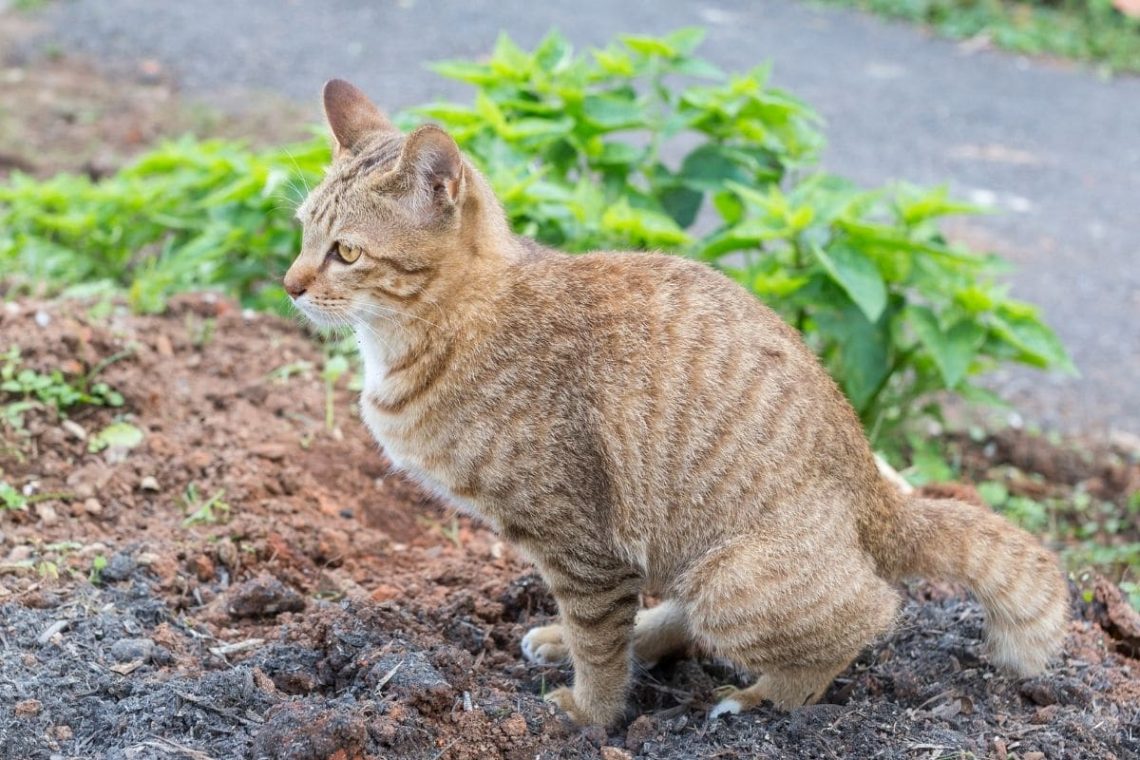In the ranking of the most popular pets, cats are right at the top
However, the free roamers among them are not welcome everywhere. These 10 home remedies act as a gentle cat deterrent and keep the animals away.
To the point
- transmission of diseases possible through cat droppings
- also hunt beneficial insects
- for successful measures knowledge of cat behavior helpful
- only animal-friendly repellent methods allowed
- strongly smelling plants are suitable as gentle cat deterrents

Contents
- 1 Home remedies as a cat deterrent
- 2 Water
- 3 Plants
- 4 (Plectranthus ornatus)
- 5 Prune roses
- 6 Tartar hedge cherry
- 7 Hawthorn
- 8 From the kitchen
- 9 Coffee grounds
- 10 Vinegar
- 11 Cinnamon
- 12 Rabbit wire
- 13 Mulch
- 14 Frequently asked questions
- 15 How can you propagate the piss off plant yourself?
- 16 Do you have to tolerate contamination by neighborhood cats on your own property?
- 17 How do the commercially available ultrasonic devices work?
- 18 Author
Home remedies as a cat deterrent
We present suitable home remedies for driving away free-roaming cats.
Water
Cats do not like water, every child knows that. Due to this property, the term “cat wash” was created for quick, not very thorough washing. Water is perfect as a cat deterrent. Here’s how to do it:
- Fill a spray bottle with cold water.
- As soon as you get the intruder near you, spray him with it.
- If that doesn’t make enough of an impression, use the garden hose. The pussycat will remember the experience and will give your property a wide berth for quite some time.
Plants
(Plectranthus ornatus)
The name of the Piss off plant (Plectranthus ornatus) says it all. The leaves spray a very strong, unpleasant odor for animals. Humans only perceive the menthol-like scent when they smell the leaves directly.
This is how you use the cat deterrent in the best possible way:
- Observe the free roamers during their tour of your garden.
- Plant the frost-sensitive Verpissdich plant in the preferred places after the Ice Saints.
- In summer and autumn, it unfolds its effect within a radius of one to two meters. Therefore, you need to put several plants for a successful defense
.
Note: Other strongly scented garden herbs are also disliked by cats. Lemon balm, mint, garlic or rosemary can be used successfully as a gentle cat deterrent.
Prune roses
Cats make a big ground around thorny shrubbery. You can take advantage of this trait to repel the free-rangers. Place shredded rose prunings and clippings of thorny hedges around vegetable beds.
Tip: Did you know that healthy cats can catch up to twelve mice a day? So if you’re struggling with a plague of mice, don’t use a cat deterrent in your garden.
Tartar hedge cherry
Unlike the annual piss-off plant, the Tatar hedge cherry (Lonicera tatarica) is perennial and hardy. The shrub can reach a height of four feet. With pink flowers, the cat’s paw will become a decorative eye-catcher in your garden in May and June.
Observe the walking paths of the cats.
Check if there is a suitable sunny to semi-shady place for the honeysuckle along the paths.
Dig a planting hole and plant the shrub.
Hawthorn
Hawthorn hedges (Crataegus)
form effective protection against uninvited cat visitors. Velvet paws detest the thorny undergrowth and look for a more accessible garden.
From the kitchen
Coffee grounds
Coffee grounds are much more than a waste product from making coffee. The popular household remedy is used as a rose fertilizer or to loosen the soil. The brown powder quickly puts an end to slugs and snails. Likewise, coffee grounds help to gently drive cats out of the garden.
Proceed as follows:
Collect coffee grounds over several days in an airy container, stirring them several times to prevent mold from forming.
Spread the coffee grounds on the places on your property most popular with unwanted garden visitors.
Repeat the procedure regularly.
Tip: You can also use coffee grounds as an organic fertilizer or for biological aphid control.
Vinegar
Pungent vinegar odors are not for delicate cat noses. You can gently drive cats away with this simple home remedy. Here’s what to consider for successful application:
Mix vinegar, water and liquid soap in equal parts.
Pour the mixture into a spray bottle and spray the areas in your yard that cats prefer.
Cinnamon
Humans love the smell of cinnamon. Cats don’t see it that way. They loathe our favorite Christmas scent. Knowing this can help in driving away the pussycats.

Place a few cinnamon sticks around the most vulnerable spots in the garden. Neighbor’s cat will turn up his nose and give it a wide berth.
Rabbit wire
If you’ve just seeded vegetables, rabbit wire will effectively keep the outdoor cats from doing their business on the bed. Place rabbit wire over the bed. The cat deterrent works and the seeds can sprout undisturbed.
Mulch
Cats love to roam over the beds. However, they don’t like wet paws. Mulch your beds wherever you can. The moisture will gently act as a cat deterrent and the bed will no longer be an option as a place for the litter box.
Mulch vegetable beds and harvested areas with lawn clippings.
Combine this home remedy with other cat repellent methods, such as coffee grounds.
Frequently asked questions
How can you propagate the piss off plant yourself?
The best way to propagate is by cuttings. Cut off a few stems and remove the lower leaves. Roots will soon form in a glass of water or in moist soil. Plant the seedlings in the cat’s favorite places.
Do you have to tolerate contamination by neighborhood cats on your own property?
Again and again, courts have to deal with the question of who is liable for contamination by cats. Each case must be considered individually. As a guideline, one free-roaming cat per neighbor and the associated contamination of the flower beds must be tolerated. The free run belongs to the natural behavior of the animal. Damage caused by cats is usually covered by the owner’s personal liability insurance.
How do the commercially available ultrasonic devices work?
The commercially available cat deterrent is usually solar powered. As soon as an animal comes near, a motion detector reacts and emits an ultrasonic sound that is unpleasant for cats. Humans cannot perceive this frequency. The cats get scared, run away and will avoid the area in the future.

